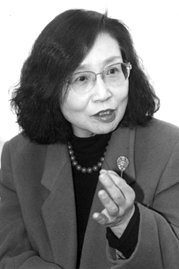Yayori Matsui
Yayori Matsui | |
|---|---|
 | |
| Born | April 12, 1934[1] |
| Died | December 27, 2002 (aged 68) |
| Nationality | Japanese |
| Known for | Women's rights in Asia |
Yayori Matsui (松井やより, Matsui Yayori) was a Japanese journalist and women's rights activist.[2] She is noted for her work to raise awareness for sex slaves in post-war Asia.[3]
Biography
Yayori was born in Kyoto, Japan in a family of Christian ministers.[4] Unable to graduate from high school due to a severe case of tuberculosis, she was nonetheless admitted to the Tokyo University of Foreign Studies. Yayori was introduced to the feminist movement while on a trip to the United States and Europe during her junior year in college.[1] In 1961, Yayori joined the Japanese newspaper Asahi Shimbun as a reporter, covering public health and environmental issues.[4]
Yayori was influenced by the trend of South-East Asian "sex tours" among Japanese businessmen. In 1976, she founded the organization "Asian Women in Solidarity" in opposition to sex tourism in Asia. In 1981, she was posted as a correspondent in Singapore, where she came into contact with "comfort women", women who were forced into prostitution by the Japanese military during the Second World War.[5] She became the first woman to serve as the Asian General Bureau Correspondent for the Asahi Shimbun.[4] In 1994, she resigned from the Asahi to work full-time as a social activist. Working with the Asia-Japan women's resource center, she organized a mock tribunal in 2000, on crimes against sex-slaves committed by the Japanese Imperial Army.[3] In 2001, she visited Afghanistan to meet with Afghan feminist-activists. While there, she was struck by illness, which was later diagnosed to be liver cancer. She died in a hospital in Tokyo in December 2002.[2]
References
- ^ a b Magnier, Mark (January 8, 2003). "Yayori Matsui, 68; Japanese Journalist Became Noted Women's Rights Activist". Los Angeles Times. Retrieved 16 June 2012.
- ^ a b Saxon, Wolfgang (January 5, 2003). "Yayori Matsui Dies at 68; Championed Asian Women". The New York Times. Retrieved 16 June 2012.
- ^ a b Brasor, Philip (March 9, 2003). "Yayori Matsui's legacy lives on -- as intended". Japan Times. Retrieved 16 June 2012.
- ^ a b c "Yayori Matsui (1934-2002)". Asia-Japan Women's resource center. Retrieved 16 June 2012.
- ^ "Feminist journalist Yayori Matsui dies". Daily Times. December 28, 2002. Retrieved 16 June 2012.
- Yumiko Mikanagi (2004), "In Memory of Matsui Yayori Who ‘Loved, Angered and Fought Courageously’" , International Feminist Journal of Politics, 6:1, 141-149, DOI: 10.1080/1461674032000165978.
